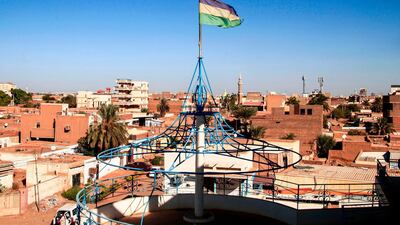27 years ago, the US declared Sudan a state sponsor of terrorism, ushering in a raft of sanctions and strict controls to limit a range of nefarious activity by the regime of then-president Omar Al Bashir. On Monday, America removed Sudan from the list, which now includes only Iran, Syria and North Korea.
For three decades, Sudan's people suffered from paranoid and incompetent politics. This blighted the country's economy and global reputation, and bottled up the immense potential and goodwill of Sudanese citizens.
A popular protest movement demanding better government and living standards saw Al Bashir step down in April 2019, heralding a turnaround in Sudan's fortunes. Since then, the country, which is governed by a joint civilian and military executive, has taken steps to end its isolation. These include paying compensation to the victims of terrorist attacks carried out by Al Qaeda, an organisation Al Bashir's government supported. Now removed from the US State Department's list and free from the sanctions it entails, Khartoum can start looking to the future.

Sudan's transition to stability will not be immediate. There have been a series of clashes between security forces and protesters, and the economy continues to struggle. However, recent history shows that a complete retreat of security forces in the aftermath of popular protests can have even more serious consequences. And despite tragic moments, the country's revolution has been more stable than in other parts of the region, including Syria and Libya.
Khartoum's stability matters in both Africa and the Middle East. It shares large and, in some places, porous borders with Egypt, Libya and Ethiopia. Tensions among these countries have flared this year due to a new civil war in Ethiopia, as well as Addis Ababa's plans for the Renaissance Dam on the Nile.
Sudan's burgeoning relationship with states like the US and Israel will change its position in the diplomatic and security landscape of the region, but the country needs economic relationships, too. The vulnerability of its economy – which has been affected this year by locust plagues, the pandemic and pre-existing issues like widespread poverty – leaves the country open to more challenges, including high unemployment, protests and internal discontent. This is a real prospect, given the International Monetary Fund's prediction that Sudan's GDP will shrink by 8.5 per cent this year. The UAE announced a $1.5 billion grant to support the country in 2019, a critical lifeline at a critical time.
In the long term, however, the country will need to be able to support itself. The removal of US sanctions allows Sudanese people to build a private sector and engage with international markets on its own terms. A banking system can begin to emerge. A September report from the UN Development Programme found that roughly $3bn in remittances enter the country through unofficial means. If these were re-routed through a responsible banking sector, the resulting tax revenues would be significant.
Sudan's early, but promising, progress demonstrates the myriad benefits open to countries when they re-enter the international fold. If managed correctly, Sudan's transition to an open nation can stand out as an alternative for the pariahs that remain sponsors of extremism. And more importantly, it can forge a path forward for the people of a country that has much to offer the world.


